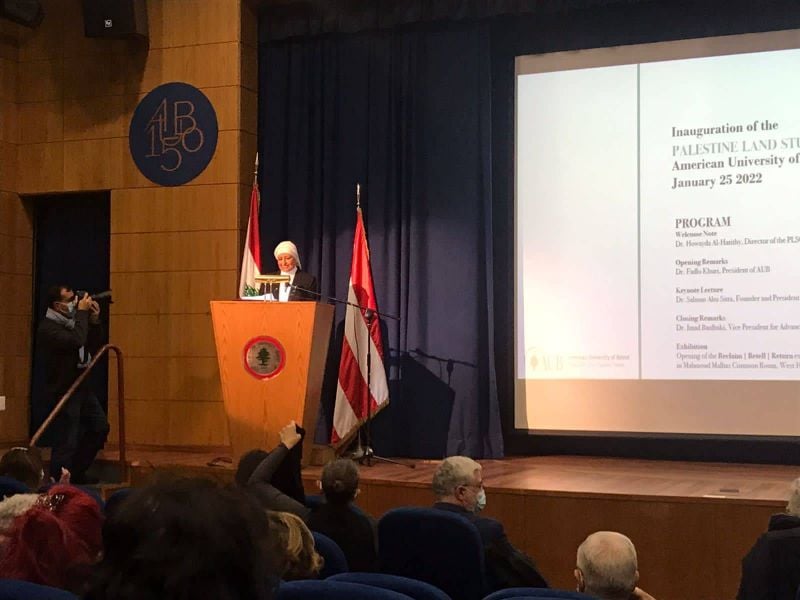
Founding Director Howayda Al-Harithy speaking during the inauguration ceremony of the Palestine Land Studies Center at the American University of Beirut, Jan. 25, 2022. (Credit: Ali Ghaddar)
BEIRUT – In 1962, when Salman Abu Sitta was doing his Ph.D. at the University of London, he was unable to find maps of Palestine for his research. “The name ‘Palestine’ was deleted and was replaced by the name ‘Israel’,” he recalled. This was the impetus for Abu Sitta to begin a lifelong journey to collect every map and document about Palestine he could lay his hands on, “from the time my hair was black till it turned silver,” as he put it.
Today, this collection stands at 10,000 books, 2,000 maps, as well as over 5,000 aerial photos and the archives of organizations working in Palestine, such as the Quakers and the Red Cross.
Using this archive, Abu Sitta founded the Palestine Land Society in London 22 years ago to represent the Palestinian cause “in a scientific, factual and relevant manner.”
His aim was to disprove myths, such as the old trope of Palestine as a land without a people, using property deeds, maps and reports. This led to the publication of countless papers and two books which have been translated into multiple languages. But where to house this massive trove of documents?
And so the Palestine Land Studies Center (PLSC) at the American University of Beirut was formally launched on Tuesday, with a ceremony that included a recorded keynote lecture from Abu Sitta, who was unable to attend due to COVID-19 travel restrictions. His daughter, Rania Abu Sitta, attended in his place.
The idea behind creating the center arose in 2017 during a meeting between AUB President Fadlo Khuri and Abu Sitta. He wondered aloud where a suitable place to store his archive might be, to which Khuri replied, “there was only one academic institution in the world where this belongs, and it was at AUB,” he recounted during a speech at the ceremony.
The choice of AUB was especially appealing, as Abu Sitta wanted to make his archive accessible to Arabs who have difficulty obtaining visas to travel to Europe or the United States.
The center will provide students and researchers alike with access to these vital and rare documents, and is part of what AUB calls its “ ongoing commitment to the preservation, reclamation and dissemination of Palestinian history,” on its website.
PLSC’s Founding Director Howayda Al-Harithy said AUB and Abu Sitta's vision for the center is for it to be “a catalyst for interdisciplinary research and a global hub for grassroots investigations and dialogue around the question of land and population in Palestine,” and upholding the rights of Palestinians and their right of return.
”To all Palestinians struggling for their rights in Sheikh Jarrah, in Gaza in Naqab and throughout Palestine, I say power to you,” Harithy said in a speech at the inauguration ceremony.
AUB itself has a long history of supporting the Palestinian cause, according to Khuri. “An abiding commitment to Palestine is one of the hallmarks and even tenants of this University,” he said, adding that it was at AUB where the Nakba was first named by Constantine Zurayk.
There is still a long way to go, according to AUB Vice President for Advancement Imad Baalbaki, who revealed plans to enrich the center through initiatives such as an endowed chair in Palestine studies, new fellowships and scholarships, endowed research funds, seminars, lecture series and exhibits, all of which would need fundraising.
“There’s just so much material there,” said PLSC’s coordinator Michael Avanzato speaking to L’Orient Today. “We hope it can all be put to good use supporting the liberation of Palestine and the right of return.”
An exhibit of the center’s collection at AUB is open to the public for the next week.